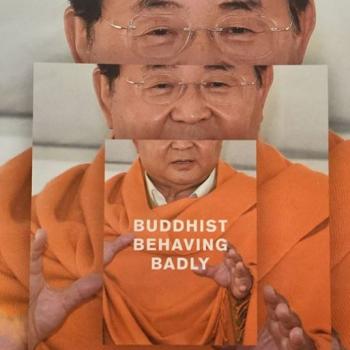Richard Gombrich is one of the
heaviest hitters in contemporary
Buddhist Studies. Read the wiki page on him. I need not say more.
Well, two (or three) more quick things. First, I have and am continuing to utilized Gombrich’s work on
metta (loving-kindness) and the
brahma-viharas (Divine abodes) for my own studies on Buddhist ethics. Some of that was presented at an AAR conference in Montreal in 2009 and
might be published soon, and some will no doubt filter into my current and future work. Second, I used
What the Buddha Thought in my
Buddhist Philosophy class last fall in India, with generally very good results. And lastly, that very same book is now a winner of a
Choice Outstanding Academic Title award for 2010 (see
here).
Johannes Bronkhorst doesn’t have a wiki page (yet, except
this). He does have an impressive CV (see .pdf on
this page) and a long history of work on early Indian thought. His latest work is this:
Johannes Bronkhorst. Greater Magadha: Studies in the Culture of Early India. Handbook of Oriental Studies Series. Leiden: Brill, 2007. xix + 414 pp. $182.00 (cloth), ISBN 978-90-04-15719-4.
I haven’t read it yet, and I’m not sure I will any time soon. I’ve read bits and pieces from his
Buddhist Teaching in India and generally found his arguments/reasoning to be solid whenever he was restating accepted theories. But at times he would seem to say strange things – the specifics of which I don’t recall well enough to write about now. To be perhaps vague and/or diplomatic, Bronkhorst seems to be challenging conceived wisdom as to many aspects of early Buddhist history, philosophy, and practice. Many of my teachers, who I deeply respect, are that conceived wisdom. And some of that conceived wisdom comes from the books of Richard Gombrich.
This week Alexander Wynne published a review of Bronkhorst’s latest work, as commissioned by Daniel Arnold for H-Buddhism. Just to post the beginning of this great review:
According to standard textbook histories of ancient India, Hinduism, or at least some similar form of Brahminism, was the dominant religion rejected by the Buddha, who, in response to the class privileges and rituals of the Brahmins, formulated a “new” Dharma. This understanding of the cultural and intellectual background to early Buddhism is firmly rejected in Johannes Bronkhorst’s Greater Magadha. Countering a view he believes is “largely mistaken,” Bronkhorst instead proposes that Buddhism originated in the non-Vedic culture of “Greater Magadha,”…
If you’re not a student of early Buddhism, it might be hard to grasp just how earth-shaking Bronkhorst’s claims might be. For some, that is exciting. For others, like me, it’s a bit unsettling. A bit of that unsettling nature is knowing that I really don’t know nearly enough to argue one way or another in the ‘debate’. Having studied this stuff for more than 10 years, and having been told that Buddhism emerged from a background in Brahmanism (terms like brahma-vihara refer explicitly to this background), I find it hard to fathom what it would mean that all of this is “largely mistaken.”
As Carl Sagan famously stated, “Extraordinary claims require extraordinary evidence.”
Oh and really lastly (concerning Gombrich), I’ll be studying Pali with him at Oxford starting August 13th.











